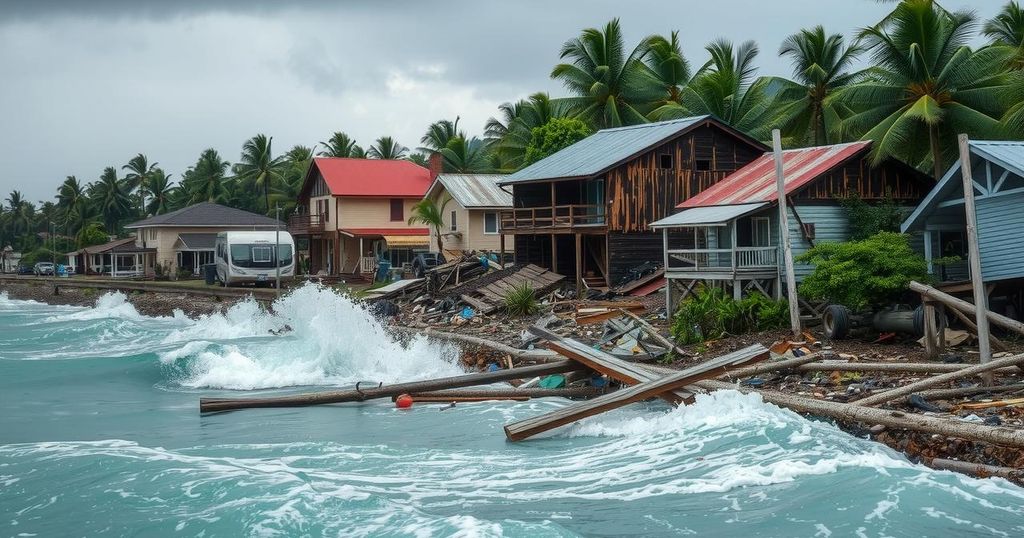Cyclone Chido has struck Mayotte, causing severe destruction and fears of thousands of casualties. Rescue efforts are complicated by damaged infrastructure, leading to significant power outages and reliance on military aircraft for aid delivery. Over 100,000 residents live in slum conditions that have largely been destroyed, highlighting the socio-economic vulnerabilities exacerbated by increasing cyclone intensity attributed to climate change.
On Monday, rescue teams were rapidly mobilized to assist the French overseas territory of Mayotte, which has been severely impacted by Cyclone Chido, the most destructive storm experienced in the region in nearly a century. Despite the official death toll being reported at 14, local authorities have expressed grave concerns that the number of casualties could reach into the hundreds or even thousands, given the density of the population in this area of approximately 300,000 citizens. Reports indicate that multiple neighborhoods, primarily consisting of inadequate housing, have been obliterated, and critical infrastructure, including airports and hospitals, has sustained substantial damage.
Compounding the difficulties of the rescue efforts, the control tower at Mayotte’s airport is reported to be damaged, limiting operations to military aircraft. Additionally, widespread power outages have further complicated the recovery response. To address the urgent need for aid, rescue workers, military personnel, medical staff, and essential supplies are being dispatched from mainland France and the neighboring island of Reunion. Despite Mayotte’s designation as the poorest territory under European Union governance, it remains a destination for numerous economic migrants seeking better opportunities supported by the local welfare system.
The French Red Cross has indicated that a significant number, approximately 100,000 individuals, reside in makeshift slum accommodations on Mayotte, the majority of which have been entirely destroyed as a result of Cyclone Chido. The cyclone, categorized as a category-4 hurricane, struck Mayotte on Saturday and subsequently impacted Madagascar, just south of the archipelago. Experts suggest that climate change may have influenced the intensified nature of Chido, as historical data show that while the frequency of cyclones has not increased, their intensity appears to be on the rise due to warming atmospheric and oceanic temperatures.
Cyclone Chido’s landfall in Mayotte marks a significant climatic event, as it is heralded as the worst storm to strike the region in nearly a century. The cyclone’s trajectory also affected Madagascar, raising concerns about the broader impacts of climate patterns in the southwestern Indian Ocean, particularly in relation to the ongoing cyclone season that commenced in December. The unfortunate consequences of this natural disaster highlight vulnerabilities within socio-economically disadvantaged territories such as Mayotte, where inadequate infrastructure contributes to the severity of impacts during extreme weather events. Additionally, the influence of climate change on storm intensity underscores a growing area of concern within the scientific community, as warming waters and air may lead to more potent cyclones, despite unchanged frequencies of such phenomena. This recognition aligns with observations about global warming contributing to the increasing severity of adverse weather conditions.
In conclusion, Cyclone Chido has wrought catastrophic damage on the French territory of Mayotte, with local officials fearing significant loss of life in the aftermath of the storm. Amid rescue and recovery efforts hampered by damaged infrastructure, the vulnerability of Mayotte’s population is starkly highlighted, particularly regarding the prevalence of informal housing that has left many residents tragically exposed to the elements. As attention turns to addressing immediate humanitarian needs, the incident serves as a poignant reminder of the urgent discussions surrounding climate change and its capacity to exacerbate natural disasters.
Original Source: www.cbsnews.com






